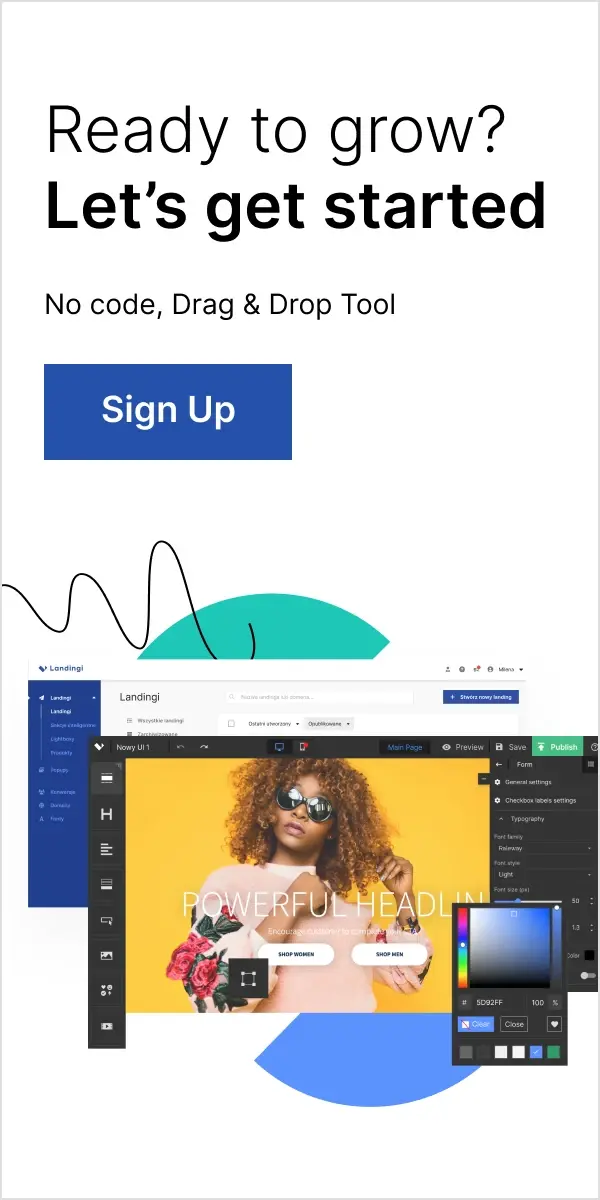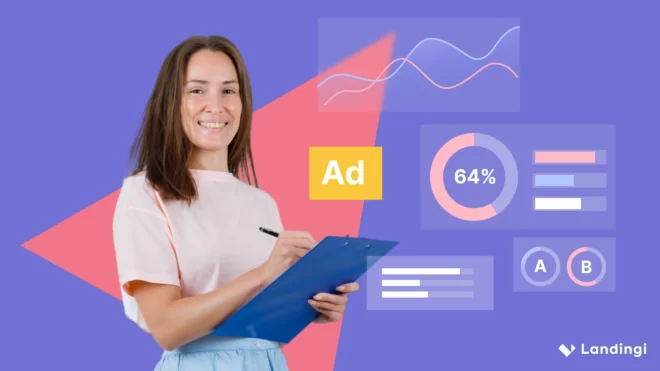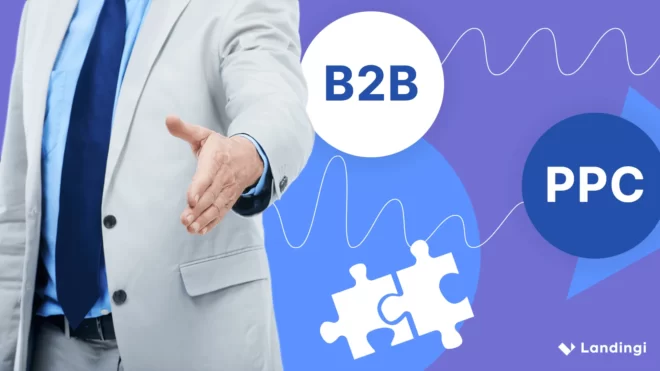Pay-per-click (PPC) advertising is one of the most powerful digital marketing strategies bringing fast results, in which advertisers pay a fee each time their ad is clicked. For the real estate industry, PPC offers a targeted approach to reaching potential house buyers and sellers, those looking for design services, and others, driving highly qualified traffic to specific listings and real estate services. This method, involving various channels and formats, ensures that your marketing strategy works well, promoting your business to a wide audience and attracting individuals actively searching for real estate solutions.
In real estate PPC campaigns, the effectiveness of your ads is significantly influenced by the landing pages they direct traffic to. An optimized landing page can drastically improve conversion rates by providing visitors with a seamless and relevant experience. The best landing page tool for marketers in the real estate industry is Landingi, a platform for building, testing, and optimizing PPC landing pages. It offers user-friendly design features, a user behavior tracking tool, and powerful A/B testing capabilities to ensure your PPC pages perform at their best.
By reading this article, you’ll uncover top PPC strategies and identify the ideal tools to streamline and enhance your campaigns. Scroll further to explore real-life examples of successful real estate PPC campaigns, and follow our comprehensive guide to achieve the best results.
Key takeaways:
- PPC advertising in the real estate industry enables businesses to achieve better visibility in search results, directly reaching potential buyers and sellers actively looking for properties or real estate services.
- PPC, compared to organic search strategies, gives faster results in quality lead generation.
- A successful real estate PPC campaign necessitates strategic keyword selection, geotargeting, and compelling ad copy.
- PPC advertising is cost-effective because businesses only pay when someone clicks on their ad.
- Well-optimized PPC landing pages drive higher engagement and conversions by offering a seamless and engaging user experience tailored to real estate consumers.
- Real estate businesses, including property management firms, agents, developers, and rental services, can benefit from PPC advertising by targeting specific customer demographics and services to attract new leads and clients.
- PPC strategies provide measurable results, allowing businesses to track real-time performance and adjust their campaigns for better outcomes.
- Ensuring compliance with advertising regulations and maintaining transparency with customers is crucial. This includes clear communication about prices, promotions, and terms of service, as well as adhering to industry standards and guidelines.
- It’s vital to review and optimize PPC campaigns regularly by tracking performance metrics, conducting A/B testing, and staying updated with the latest trends in PPC advertising.
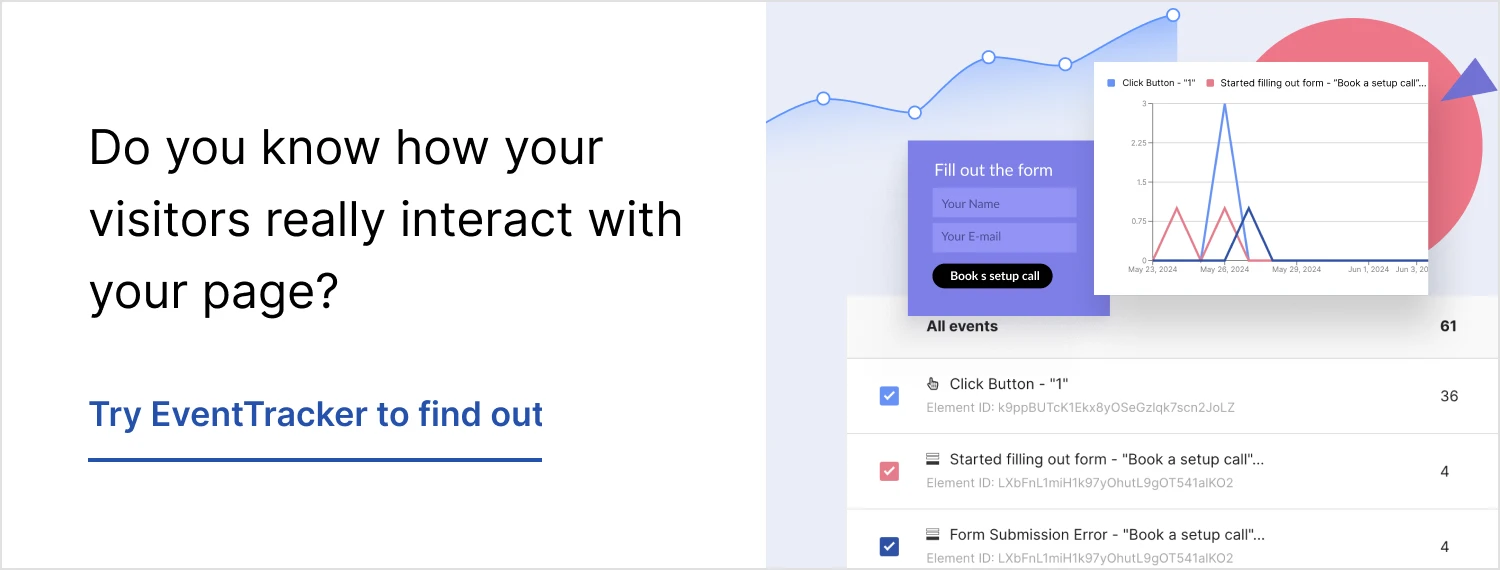
What Is PPC Advertising in Real Estate?
PPC advertising in real estate is a digital marketing strategy where industry-related businesses pay a fee each time their ads are clicked. Essentially, it’s a way to buy visits to your site rather than attempting to earn those visits organically. In real estate, PPC ads often drive targeted traffic to listings, agent websites, or specific real estate services.
These ads can appear on search engines, social media platforms, and various websites. Real estate PPC advertising is particularly effective because it allows precise targeting based on location, demographics, and user behavior. For instance, a real estate agent can create ads targeting potential homebuyers searching for properties in a specific neighborhood or city. By bidding on relevant keywords like “homes for sale in [city]” or “real estate agents near me,” advertisers can ensure their ads are shown to users who are actively looking for real estate services or properties.
Moreover, PPC advertising provides valuable insights through analytics, helping real estate professionals track the performance of their ads in real-time. This data can inform adjustments to ad strategies, optimizing for better results such as higher click-through rates (CTR) and improved conversion rates. Overall, PPC advertising is a powerful tool for real estate marketers aiming to attract quality leads and increase their visibility in a competitive market.
Who Should Use PPC in Real Estate?
PPC advertising in the real estate industry can be a great digital marketing tool for agents, brokers, investors, developers, architects, and home builders. Property management and real estate marketing firms can benefit significantly from PPC campaigns, as they help attract tenants, property owners, and new clients. The key users of real estate ppc include the following:
- Real estate agents and brokers – they can increase their visibility in specific local markets by targeting specific keywords related to their area and capture leads by directing traffic to landing pages with contact forms or home valuation tools.
- Real estate agencies – larger agencies can use PPC to build brand recognition and establish a strong online presence, for instance, when entering new markets or promoting new services. They also use PPC to drive traffic to their property listings.
- Real estate investors – their ads can be designed to attract homeowners who are looking to sell quickly, often leading to lucrative investment opportunities. They also use PPC for market research, gathering valuable data on where to focus investment efforts.
- Real estate developers – they can use PPC to promote new developments and projects, as targeting potential buyers with ads showcasing new properties can drive interest and sales. PPC is also a good step in the sales funnel, allowing them to nurture the potential customers they have acquired through ads.
- Property management companies – they can use PPC ads to attract tenants by targeting individuals searching for rental properties in specific areas or to promote their services to property owners who might be looking for professional management solutions.
- Real estate marketing firms – they can use PPC to attract new clients, showcasing their ability to generate leads and drive sales through effective online advertising.
- Home builders – they can use PPC to drive traffic to their model homes and new developments, attracting buyers looking for newly constructed homes. Builders offering custom home-building services can target individuals interested in building a new home, showcasing their portfolio and capabilities.
What Are the Benefits of Using PPC Advertising for Real Estate?
PPC ads for the real estate industry offer benefits, such as quick results, increased visibility, flexible budgeting, and more, which can greatly improve the marketing efforts of agents, brokers, developers, and other industry professionals. The key advantages of PPC marketing strategy in the real estate industry include the following:
- Targeted advertising – PPC allows real estate professionals to target specific demographics, locations, and user behaviors, ensuring ads are shown to the right audience.
- Cost-effective marketing – with PPC, real estate businesses only pay when someone clicks on their ad, making it a cost-effective advertising strategy. This model helps maximize the ROI by ensuring marketing budgets are spent on actual engagement rather than impressions alone.
- Quick results – unlike organic search strategies, PPC campaigns can drive immediate traffic to a website, as ads appear at the top of SERPs, on social media platforms, etc., as soon as they go live.
- Measurable performance – PPC strategies in real estate provide detailed analytics and performance metrics, such as click-through rates (CTR), conversion rates, and cost per acquisition (CPA). This allows advertisers to fine-tune their campaigns for better results.
- Enhanced visibility – PPC ads appear at the top of search engine results pages (SERPs) and across various online platforms, which increases visibility and brand awareness and makes it easier for potential clients to find specific services.
- Flexible budgeting – in PPC campaigns, businesses can set and adjust daily or monthly spending limits as needed, ensuring they remain within their financial constraints while still achieving their marketing objectives.
- Competitive advantage – in a competitive real estate market, PPC advertising can give businesses an edge over competitors who rely solely on organic traffic. By appearing in the top search results, real estate businesses can capture a larger market share and attract more potential buyers or renters.
- Localized marketing – real estate is inherently local, and PPC allows industry-related businesses to focus their advertising efforts on specific geographic areas. Localization helps attract clients looking for properties or services in a specific target market.
- Customizable ad content – tailored messaging can increase the relevance and appeal of your ads, leading to higher engagement and conversion rates. PPC platforms enable you to create customized ad content highlighting specific properties, promotions, or unique selling points.
9 Key Strategies for Successful Real Estate PPC Campaigns
To achieve the best results in your real estate PPC campaigns, consider key strategies involving keyword selection, targeted ad copy creation, landing page optimization, ad extension usage, budget management, regular testing, and metrics tracking. Meet the 9 key strategies for successful PPC campaigns in the real estate industry:
#1 Strategic real estate keyword selection
The first key strategy in real estate PPC is strategic keyword research and selection. Depending on your offer and goals, identify relevant real estate PPC keywords that potential clients will likely use when searching for real estate services or properties, like “Properties for sale in …” or “Real estate agency in…” etc. Use tools like Google Keyword Planner to find high-traffic, low-competition keywords.
#2 Targeted ad copy creation
The second key strategy in real estate PPC is targeted ad copy creation. Craft compelling, targeted ad copy that speaks directly to your audience’s needs and interests. Highlight unique selling points, such as special offers, property features, or benefits of working with your agency.
#3 Landing page optimization
The third key strategy in real estate PPC is landing page optimization. Each PPC ad directs to a specially crafted landing page with a single purpose. Because of that, you should ensure that your page’s content aligns with the ad copy, providing a seamless experience for the user. For instance, if your ad promotes a realtor in specific localization, your landing page should include the contact form and contact details of the right person, not the agency homepage.
Ensure that your landing pages are optimized for conversions. This includes having a clear call-to-action (CTA), user-friendly design, fast loading times, and relevant content that matches the ad’s message. Tools like Landingi, offering a large real estate template gallery and user-friendly landing page builder, can help you create perfect PPC landing pages tailored to your target audience.
#4 Geotargeting and local SEO optimization
The fourth key strategy in real estate PPC is geographic targeting. As the real estate industry strongly relies on localization, focus your ads on locations where you operate or where your potential clients search for properties. Don’t forget to incorporate location-based key phrases in both ads and landing pages to boost local search performance. This helps in attracting highly relevant local traffic.
#5 Ad extension usage
The fifth key strategy in real estate PPC is ad extension usage. They provide additional information and enhance your ad’s visibility. In the real estate industry, ad extensions can highlight special offers or encourage users to contact your company. Incorporating extensions like site links, call buttons, and location information can improve click-through rates and provide a better user experience.
#6 Budget management
The sixth key strategy in real estate PPC is budget management. Determining your budget limits and aligning ad spending to your campaign plan is crucial for maximizing ROI. Set a clear budget for your PPC campaigns and allocate funds strategically across different campaigns and keywords. Remember to monitor spending to stay within budget while maximizing return on investment.
#7 Remarketing campaign implementation
The seventh key strategy in real estate PPC is implementing remarketing campaigns. These campaigns target users who have previously visited your website but did not convert. Remarketing helps keep your brand top-of-mind and encourages potential clients to return and take action.
#8 Regular monitoring and optimization
The eighth key strategy in real estate PPC is regular monitoring and optimization. Continuously monitor your PPC campaigns to track performance metrics such as click-through rates (CTR), conversion rates, and cost per conversion. Leverage analytics tools to gain insights into campaign performance and user behavior. Use this data to make informed decisions and continuously improve your PPC strategy: adjust bids, keywords, and ad copy based on performance data to optimize results.
#9 A/B testing
The ninth key strategy in real estate PPC is A/B testing. Regularly conduct split tests on different elements of your ads, such as headlines, ad copy, and CTAs, to determine which variations perform best. Use these insights to refine and improve your campaigns over time.
How to Choose Effective Keywords for Real Estate PPC Campaigns?
To choose effective keywords for real estate PPC campaigns, start with thorough research to understand your target audience’s search behavior. Use tools like Google Keyword Planner, SEMrush, or Ahrefs to identify high-traffic, low-competition keywords relevant to your market. Focus on long-tail keywords that capture specific intents, such as “buy homes in Dallas” or “luxury apartments near Big Ben,” as these tend to have lower competition and higher conversion rates.
Consider seasonal trends and local language that potential clients might use. Analyzing competitors’ keywords can also provide valuable insights. With proper tools, analyze search volumes and assess competition. Regularly review and refine your keyword list based on performance metrics, eliminating underperforming terms and adding new ones as market trends shift.
Consideration of negative keywords is crucial to avoid irrelevant traffic, ensuring your ads reach the most interested and qualified audience. Balancing broad and exact match keywords can further optimize reach and relevance, maximizing the effectiveness of your PPC campaigns.
Choosing the Best Ad Formats for Real Estate PPC
Choosing the best ad format for a real estate PPC should begin by setting clear goals and considering the target audience’s needs and expectations. When you know what you’re aiming for and know the perfect customer, choosing an ad format for your real estate business is natural. You know which platforms are best for gathering potential customers, and you can adjust your ad based on real data about the target audience. For example, when you want to promote a home design service and your perfect customer is a young family looking for an architect in their city, you should opt for PPC search ads or local service ads; optionally, you can use video ads on social media platforms.
Search ads and local service ads are perfect for lead generation, as they can target users actively searching for architects and home design services. Another great option is a video ad, which can showcase your designs and attract the target audience visually. Videos are perfect for promoting your business by sharing previous realizations or customer testimonials. Those can reach the needs of your target audience efficiently by visualizing the realization of their needs.
Selecting the appropriate ad format in the real estate industry is crucial for enhancing your campaign’s efficiency and return on investment. Each ad format serves distinct functions and can target particular audience segments effectively, as described below:
1. Search Ads
Search ads are text-based ads that appear on search engine results pages (SERPs) when users enter relevant queries. They are highly effective for capturing intent-driven traffic, targeting users actively searching for specific real estate-related terms. These ads typically include a headline, URL, and a short description, often enhanced with ad extensions like site links, call buttons, and location information to increase visibility and engagement.
The reasons why you should use search ads include the following:
- Geotargeting capabilities – localization is essential in the real estate industry, and search ads can be geotargeted to reach users in specific geographic areas. This ensures that your ads reach potential customers within a practical distance to see a flat or house for sale or decide to use your design service.
- High-intent targeting – search ads allow real estate businesses to target users actively searching for specific industry-related keywords, indicating a high level of intent. Thanks to this, you can easily reach potential customers already interested in buying a flat or scheduling a meeting, increasing the likelihood of conversions.
- Measurable results – search ads provide detailed analytics and performance metrics, allowing you to track KPIs important for optimizing your campaigns.
2. Display Ads
Display ads are visual ads that appear on websites within the Google Display Network. They can include images, animations, and text. Display ads are excellent for building brand awareness and retargeting, allowing you to reach potential clients as they browse the web. These ads are particularly useful for showcasing property images and promoting special offers, helping to capture the attention of users who might not be actively searching for real estate services but are likely to be interested.
The reasons why you should use display ads include the following:
- Visual appeal – display ads include images, graphics, and videos to create visually engaging content. This format is ideal for showcasing house designs, flats for sale, special promotions, and other offers in an eye-catching way, grabbing the interest of prospective clients and making a memorable impact.
- Engagement and interaction – interactive display ads showcasing properties for sale, new developer investments, or interior design services can drive higher engagement, leading to increased brand recall and interest in your offerings.
- Broad reach and visibility – display ads appear across various websites and platforms, including news sites, blogs, real estate forums, or digital newspaper services. It enables you to connect with a broad and varied audience, enhancing brand visibility and awareness among potential customers who might not be actively seeking new home or real estate-related services but are still interested in them.
3. Video Ads
Video ads are engaging, dynamic ads that appear on platforms like YouTube, Facebook, Instagram, or other social media channels. They are powerful for storytelling and demonstrating property features, offering a more immersive experience than text or image-based ads. Video ads can effectively convey the specific lifestyle and property’s emotional appeal, making them a great choice for promoting high-end listings, virtual tours, and real estate brand stories.
The reasons why you should use video ads include the following:
- Increased engagement and retention – video content is extremely captivating and can hold the audience’s attention more effectively than static images or text. Viewers are likelier to remember and act on the information conveyed in a video, resulting in higher retention rates and improved brand recall.
- Wider reach and targeting – video ads can be distributed across various platforms, including YouTube, social media, and partner websites. Each platform where video ad campaigns are possible offers detailed targeting options based on demographics, interests, and behaviors, ensuring your real estate ads reach the most relevant audience.
- Detailed analytics and insights – video ads can provide comprehensive analytics. You can track views, watch time, engagement rates, and conversions to understand the effectiveness of your video content and make data-driven campaign optimizations.
4. Gmail Ads
Gmail ads appear in the Promotions and Social tabs of users’ Gmail inboxes, blending in with regular emails. They expand when clicked, revealing a larger real estate ad format that can include images, videos, and call-to-action buttons. Gmail ads effectively reach a targeted audience with personalized messages, promoting property listings, newsletters, and special offers directly to potential clients’ inboxes.
The reasons why you should use Gmail ads include the following:
- Personalization and relevance – once you gathered leads, you can customize the Gmail ad content based on your leads’ interests and behaviors, including their previous actions, delivering tailored messages that resonate with specific audience segments. Gmail ads can significantly improve click-through rates and conversion rates.
- Advanced targeting options – Gmail ads offer rich targeting capabilities, allowing you to reach specific audiences based on their email behavior, demographics, interests, and previous interactions with your brand.
- Direct inbox placement – Gmail ads enable you to connect with potential customers right in their email inboxes, providing high visibility. Unlike other ad formats, Gmail ads appear in the Promotions tab, where users are already seeking deals and offers, boosting the chances of engagement.
You can strategically combine these ad formats to effectively reach your target audience, build brand awareness, and increase conversions. Each has different goals, but when combined, they can make your PPC campaign effective and highly efficient, boosting your real estate business results.
How to Manage PPC Campaigns in Real Estate?
To manage PPC campaigns in the real estate industry, you must define your objectives, choose proper keywords, create a well-optimized landing page and relevant ad copy, and then remember about ad performance monitoring and optimizing to ensure its efficiency and achieve the best results. It also includes budget management, a pillar of effective PPC advertisement.
Proper campaign management increases your chances of generating leads, boosting conversion, and building a strong real estate brand. Managing campaigns in real estate pay-per-click advertising involves the 8 key steps, as follows:
1. Defining clear objectives
Defining clear, measurable objectives for your PPC campaign is essential. These could include increasing website traffic, generating leads for real estate agents, promoting specific properties, or enhancing brand awareness. Having defined goals helps guide your strategy and measure success.
2. Real estate keyword selection
Real estate keyword selection includes identifying relevant phrases that potential clients might use when searching for real estate services or properties. Focus on long-tail keywords for more specific targeting, such as “house for sale in…” or “luxury apartments near…” – use localization words to make your ad relevant to specific localization. Remember to identify and exclude irrelevant keyword phrases, as this helps manage your budget and prevent displaying ads in unrelated searches.
3. Ad copy creation
Ad copy creation must be considered twice – engaging and persuasive ad copy that resonates with your target audience is great, but it must also be relevant with a linked landing page to ensure a seamless experience and boost conversion rates. Highlight a unique selling point, such as a special offer, property feature, or the benefits of working with your agency. Ensure your ads have clear CTAs to drive conversions.
4. Landing page optimization
A landing page that appears once the user clicks your ad must be perfectly designed and optimized to maximize conversions. Ensure your page is relevant to the ad content, loads quickly, and features a clear CTA. Include essential information and attractive visuals to keep visitors engaged and encourage them to take action. Utilize professional platforms, like Landingi, to craft, test, and optimize your ads landing page – it will allow you to maximize ROI.
5. Budget managing
Once your ad is live, regularly monitor your PPC campaigns to track performance metrics such as click-through rates (CTR), conversion rates, and cost per acquisition (CPA). Adjust your bids based on performance data to optimize your budget and improve results: increase bids on high-performing phrases and cancel low-performing keywords.
6. Advanced targeting
Advanced targeting encompasses two key adjustments: geotargeting and demographic targeting. Focus on users in particular areas, such as cities or neighborhoods where your real estate business operates. To engage the most relevant audience, customize your ads to specific demographics, like age or gender.
7. Continuous monitoring and optimization
Continuous monitoring and optimization are essential in driving well-performing real estate PPC campaigns. Use proper tools like Google Ads and Google Analytics to monitor KPIs and run A/B tests on different ad elements, such as headlines, descriptions, video length, and CTAs, to determine what resonates best with your audience. Remember to continuously review and analyze gathered data to identify trends and improvement areas in your PPC campaign.
8. Industry trends monitoring
Monitoring industry trends keeps you informed and allows you to adjust your ads to meet user expectations. Stay updated on the latest developments and shifts in the real estate market, such as new property listings, buyer preferences, and design advancements. Adapt your PPC strategy to reflect seasonal trends and promotional opportunities, like holiday sales or new property releases.
What Are the Best Tools for PPC Real Estate Campaigns?
The best tools for PPC real estate campaigns include ad creation and management tools, keyword planners, analytics tools, user behavior tracking solutions, and landing page optimization tools. Effectively managing and fine-tuning real estate ad campaigns requires powerful tools to ensure you accurately target your audience and meet your marketing objectives. Check the most valuable tools in real estate pay-per-click advertising and choose them to maximize your campaign efficiency:
#1 Google Ads
Google Ads is a powerful platform for creating and managing PPC campaigns. It enables real estate professionals to bid on keywords relevant to their market, ensuring their ads appear at the top of search engine results pages (SERPs). One of Google Ads’ key features is geographic targeting, which allows you to focus your ads on specific locations. Whether you’re targeting a particular city, neighborhood, or even a radius around your business, geographic targeting ensures your ads reach the most relevant audience. This is particularly useful for real estate professionals who want to attract clients in specific areas with properties for sale or services available.
Google Ads also offers a variety of ad extensions that enhance the visibility and functionality of your ads. The platform also provides comprehensive analytics and reporting tools that allow you to monitor the performance of your campaigns in real-time. You can track KPIs to measure the effectiveness of your ads and make data-driven decisions to optimize your campaigns for better results, ensuring that your marketing budget is spent efficiently.
Additionally, Google Ads supports remarketing, which allows you to re-engage users who have previously visited your website but did not convert. By showing tailored ads to these users as they browse other sites or use search engines, you can remind them of your offerings and encourage them to return and take action. It’s a basic platform you should have in your PPC ads toolkit to drive effective real estate campaigns focused on geotargeting.
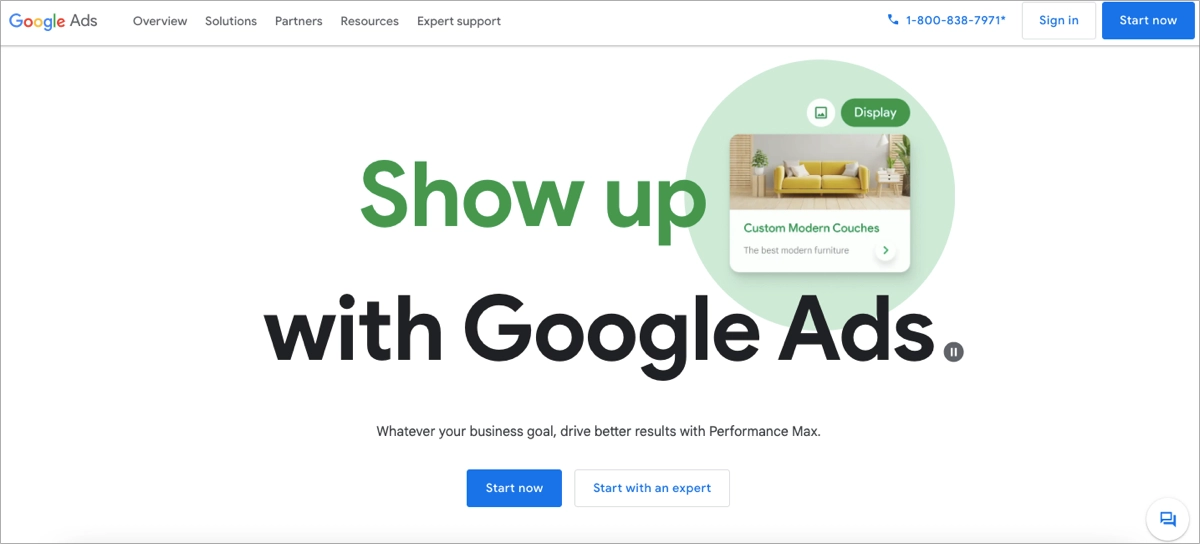
#2 Ahrefs
Ahrefs is an invaluable tool for keyword research and competitor analysis, providing real estate professionals with a comprehensive suite of features to enhance their PPC campaigns. Its capabilities allow you to uncover high-traffic, low-competition keywords that drive targeted traffic to your ads. By identifying these keywords, you can create more effective campaigns that reach the right audience at the right time, ultimately increasing your chances of conversion.
One of the standout features of Ahrefs is its ability to provide detailed insights into the keywords your competitors are targeting. By analyzing competitor keywords, you can identify gaps and opportunities in your own strategy. Ahrefs also excels in backlink analysis, allowing you to see where your competitor’s traffic is coming from and identify potential link-building opportunities for your site. By securing high-quality backlinks, you can improve your site’s authority and search engine ranking, which in turn can enhance the performance of your PPC campaigns by driving more organic traffic.
Content research is another powerful feature of Ahrefs. It enables you to analyze top-performing content in your niche, providing insights into what types of content resonate most with your audience. Ahrefs also offers tools for tracking your site’s performance, including organic traffic, keyword rankings, and backlink growth. These insights allow you to continuously monitor and optimize your PPC strategy, ensuring you stay ahead of the competition and achieve your marketing goals.
#3 SEMrush
SEMrush is an indispensable tool for real estate professionals managing PPC campaigns. Its extensive features, including keyword research, competitor analysis, site auditing, performance tracking, and A/B testing, provide all the necessary tools to create, optimize, and refine high-performing PPC campaigns.
SEMrush’s keyword research feature enables you to identify the most effective keywords for your campaigns by providing data on search volume, keyword difficulty, and competitive landscape. Competitor analysis is another vital feature of SEMrush. By analyzing your competitors’ PPC strategies, you can gain valuable insights into their keyword targeting, ad copy, and overall approach.
The platform’s site audit tool checks for technical issues, SEO errors, and usability problems, providing actionable recommendations to ensure your site is in top condition. It also offers detailed insights into ad performance, allowing you to track key metrics, measure the effectiveness of your ads, and make data-driven decisions to optimize your campaigns. Furthermore, SEMrush supports A/B testing for ads, helping you determine which versions of your ads perform best by providing detailed reports.

#4 Google Analytics
Google Analytics is essential for tracking and analyzing the performance of your PPC campaigns, offering an in-depth view of how users interact with your website. This powerful tool provides detailed insights into user behavior, including metrics such as session duration, pages per session, and bounce rates. By understanding these behaviors, you can identify which aspects of your site and campaigns work well and which areas need improvement.
One of Google Analytics’ key benefits is its ability to track conversion rates. This feature allows you to see how many users are completing desired actions. By analyzing conversion data, you can determine the effectiveness of your PPC ads and identify which keywords, ad copies, and landing pages drive the most conversions. This information is crucial for making informed decisions about where to allocate your budget and how to optimize your campaigns for better results. This tool also offers valuable insights into the overall effectiveness of your ads – you can track various performance metrics, such as click-through rates (CTR), cost per acquisition (CPA), and return on investment (ROI).
Furthermore, Google Analytics provides powerful segmentation and filtering capabilities. You can segment your audience based on various criteria, such as geographic location, device type, and referral source. This allows you to better understand different user segments and effectively tailor your PPC strategies to target the most valuable audiences. Integrating Google Analytics with your PPC campaigns allows you to create custom reports and dashboards that track your key performance indicators (KPIs) in real-time.
#5 Landingi
Landingi is a user-friendly platform for creating and optimizing landing pages that cannot be missing from your PPC toolkit. Effective landing pages are crucial for converting clicks into leads, and Landingi offers everything you need to make your PPC campaigns complete. By creating high-converting landing pages, Landingi ensures that your PPC traffic is effectively converted into potential clients.
Real estate professionals can use Landingi to create visually appealing and well-optimized landing pages for various PPC goals, like lead generation in house selling, collecting customers for property management agencies, promoting home design services, and others. The platform offers a large template gallery with landing pages designed for the real estate industry. Page building and customization process in Landingi is easy, even for those with little to no experience. Its builder includes an AI-powered content generator, AI SEO optimization feature, and AI image editor, which help to craft AI landing pages in minutes.
But landing page creation is not enough to drive effective PPC campaigns – it requires continuous optimization. Landingi offers a built-in A/B testing tool, allowing you to test different landing page versions to determine which one resonates best with your audience. EventTracker is another great feature of Landingi that provides insights into micro-conversions and visitor interactions with your landing pages. This integration with the internal analytics feature is crucial for real estate businesses where details, user experience, and great optimization matter. Landingi offers integrations with over 170 external tools, ensuring you can utilize its full potential in PPC campaign creation, optimization, and management. The Landingi platform allows real estate businesses to create landing pages relevant to ads, driving higher conversion rates.
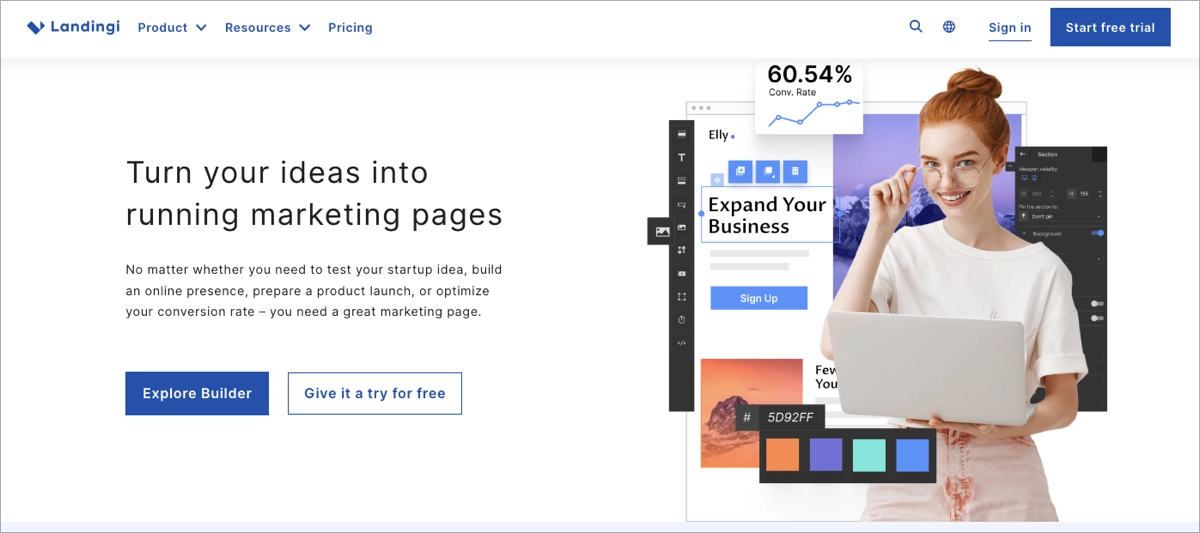
How Frequently Should You Optimize Your PPC Real Estate Campaigns?
Regular optimization of your PPC real estate campaigns is crucial to achieve the best results and maximize ROI. To ensure your campaign is well-optimized, you should regularly check reports with KPIs and refine the campaign based on actual data at least once monthly. Still, daily monitoring is crucial, as well as a more extended annual audit. To make sure your real estate campaign performs well, optimize various aspects of your campaigns with the schedule below:
- Daily monitoring – check performance metrics such as click-through rates, cost per click, and conversion rates to identify any immediate issues or trends. Daily monitoring also involves monitoring budget spending to ensure you’re not overspending or underspending, adjusting bids on high-performing keywords to maximize visibility, and controling costs on underperforming ones.
- Weekly optimization –review and adjust ad copy and keywords based on performance data. Test and optimize ad extensions, such as site links, callouts, and location extensions, to enhance ad visibility and engagement, and analyze search terms reports to identify negative keywords and add them to avoid irrelevant clicks.
- Monthly optimization – repeat larger optimization and thoroughly analyze campaign performance to identify broader trends and insights. Optimize landing pages based on user behavior and conversion data to improve user experience and conversion rates. Monthly optimization also includes updating and refreshing ad creatives to prevent ad fatigue and maintain user interest.
- Quarterly optimization – you should evaluate the overall campaign strategy and performance, making significant adjustments as needed. Perform A/B testing on different ad elements to determine what works best and implement the findings. Regularly review and refine targeting settings, including geographic and demographic targeting, to ensure you reach the most relevant audience.
- Annual optimization – once per year, run an annual audit on your PPC campaign performance to evaluate its efficiency. Conduct a comprehensive audit of your PPC campaigns to assess long-term performance and ROI. Set new goals and benchmarks based on the previous year’s data and market changes, and then plan and allocate budgets for the upcoming year, taking into account any seasonal trends or market shifts.
3 Examples of PPC Campaigns in Real Estate
To see how real estate PPC campaigns look in real life, check out the 3 examples below. They illustrate how realtors, architects, and other real estate businesses use various PPC strategies in their digital marketing campaigns.
1. HomeLight
The first example showcases how to leverage search ads in the real estate industry properly. The HomeLight agency launched a PPC campaign to promote their real estate agents in Jersey City – the ad appears at the top of SERPs, making it a natural choice for users already looking for similar services. This campaign is successful thanks to well-chosen keywords and great geotargeting. It’s enough to type “real estate agent New Jersey”, and HomeLight’s ad displays as one of the first results.

Once the user clicks the ad, it directs him to a well-optimized homepage. Its clear layout highlights the single focus on searching for real estate agents. Users are guided through clear headlines to the search bar with an outstanding CTA button indicating what they should do next. The consistency is powerful – search ads direct to the clear page where there is nothing more than a search bar for their agents in a location chosen in a Google search phase. This is what makes the campaign highly effective.

Craft a PPC landing page for your real estate business with Landingi – choose the Meet Developer template or select from over 400 designs optimized for maximizing your campaign results. The Landingi AI-powered builder allows you to customize each template easily and automatically adjusts your page for mobile devices.
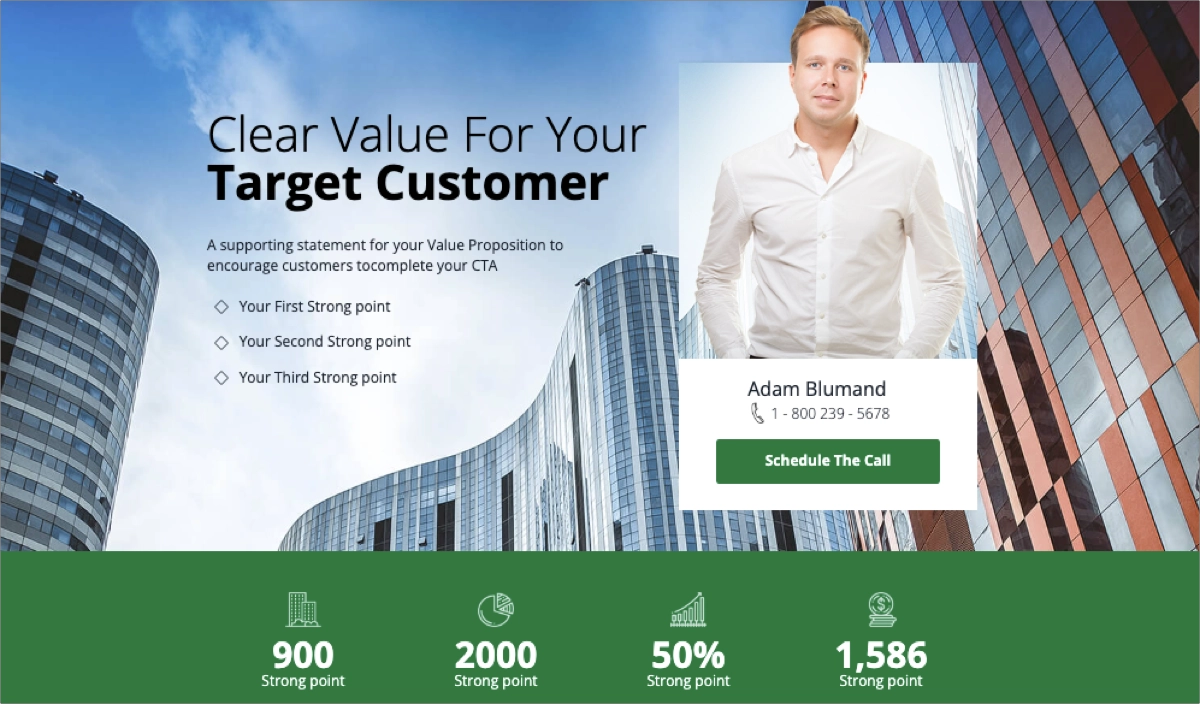
2. Webber + Studio
The second example showcases another search ad, this time launched by interior design company Webber + Studio. Their ad appears at the top of Google SERP once the user types proper keywords with localization where the company operates. This ad is simple, without extensions, yet the great copy makes it inviting for potential customers, and adding a thumbnail picture boosts its visibility.

The landing page linked to this ad is well-designed, with a clear and simple layout and an outstanding CTA button placed in the hero section. Its compelling headlines and short descriptions affirm user landed in the right digital space, consistent with the ad. The focus on a single goal, lack of navigation, and CTA with great messaging boost the efficiency of this real estate PPC campaign, maximizing conversion rates.

3. Antrans Invest
The third example showcases a display ad for the Antrans Invest developer. It appears on a popular platform with daily news, attracting a wide group of potential customers and boosting brand awareness. Display ads are related to users’ activity across the web, so they are not targeted with high purchasing intent but meet users’ interests.

This ad is large and well-placed, so it can’t be missed, and its visual power makes the brand recognizable. Once the user clicks the ad, he lands on a lead generation landing page with a contact form, which correlates with the ad’s copy. The page is designed to streamline the contact path, including not only a form but also the “call now” button. What makes it unique is the direct phone number with the name of an agent responsible for this particular offer – it also builds trust among potential customers, boosting conversion rates.
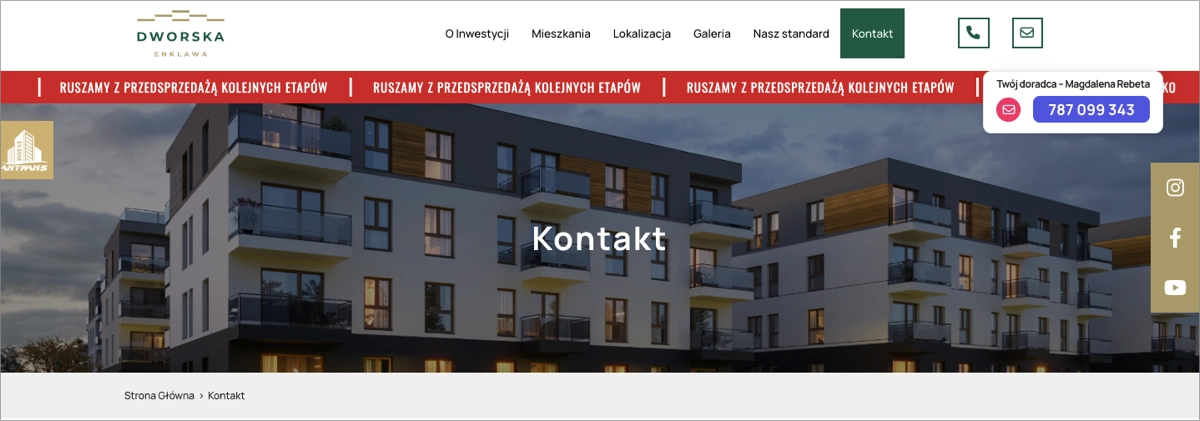
How to Measure the Success of Your Real Estate PPC Campaigns?
To measure the success of your real estate PPC campaigns, you should begin by setting proper KPI tracking, including click–through rate (CTR), cost–per–click (CPC), and conversion rate. The most important factor for measuring overall campaign success is ROAS – return on ad spend. While CTR showcases the performance of your ad’s copy, the conversion rate indicates how well these clicks turn into desired actions. CPC is a rate crucial for determining your campaign’s financial efficiency, but overall success can be measured with ROAS.
Using Google Ads, you can also track additional metrics, like Quality Score, which combines CTR, ad relevance, and landing page efficiency. It’s helpful in determining further optimizations. With Google Analytics you can also track traffic sources, gathering important data for campaign targeting optimization. Regular KPIs review can help you identify trends, make data-based decisions on further campaign optimization, and improve the overall campaign performance.
How to Track ROI and Conversion Rates in Real Estate PPC?
To track ROI and conversion rates in your real estate PPC campaigns, set the Google Ads tracking tag on your ad’s landing page and define the campaign goals in Google Analytics. This lets you track the most important KPIs, including conversion rates – the number of users who completed the desired action, which is your campaign’s goal, e.g., filling out a contact form or using a “call now” button.
Having access to the crucial metrics, you can easily calculate ROI with the following formula:
The ROI formula allows you to count ad efficiency in percentage, indicating the total return on ad investment. Both metrics are vital for comprehending the performance of your real estate PPC strategy and assessing financial success. However, consistently monitoring KPIs is also key for optimizing campaigns, enabling you to evaluate the effectiveness of your marketing efforts.
What Are the Latest Trends in PPC Real Estate Marketing?
In 2024, several trends are reshaping PPC real estate marketing, involving the use of AI and data analytics, which allows for hyper-targeted audience segmentation and improved lead generation through predictive analytics. Another PPC trend in real estate marketing is video ads, including VR tours and live streaming – this type of content is becoming essential for engaging potential buyers.
The expansion of social media advertising is ongoing, with platforms like Facebook and Instagram providing wide targeting capabilities. Employing long-tail and intent-driven keywords is essential for higher conversion rates and reducing costs. Furthermore, automation tools boost campaign efficiency and scalability, simplifying advertisements’ management and real-time optimization.
What Are Common Mistakes to Avoid in Real Estate PPC?
The common mistakes you should avoid in real estate PPC marketing strategies include the following:
- Ignoring negative keywords – neglecting to utilize negative keywords can result in your ads being triggered by irrelevant searches, leading to unnecessary clicks and a wasted advertising budget on uninterested audiences.
- Poor ad copy – generic or unclear ad copy can fail to capture attention and reduce click-through rates.
- Not using location targeting – overlooking the importance of geo-targeting in the real estate industry can result in ads reaching irrelevant regions, diminishing the ad’s effectiveness.
- Neglecting mobile optimization – with significant traffic accessing ads via mobile devices, not optimizing for mobile can lead to a poor user experience and lost leads.
- Ignoring analytics – failure to monitor and analyze campaign performance can preclude necessary changes to improve ROI.
- Overlooking landing pages – directing traffic to poorly designed or irrelevant landing pages can significantly reduce conversion rates.
- Budget mismanagement – not allocating your budget wisely can lead to overspending on low-performing ads while neglecting high-performing ones.
- Skipping A/B testing – not experimenting with different ad copies, images, and strategies can result in missed opportunities for optimization and improvement.
- Lack of retargeting – neglecting to set up retargeting campaigns can result in losing the opportunity to convert users who have previously expressed interest in your ads but did not complete the desired action.
How to Choose the Right PPC Agency for Your Real Estate Business?
To choose the right PPC agency for the real estate business, begin by assessing the agency’s experience in the real estate sector, as industry-specific expertise can significantly impact campaign success. Look for a proven track record, including case studies and client testimonials, to assess their ability to deliver results. Evaluate their approach to keyword research and ad targeting, ensuring they employ strategies tailored to your market and audience. Additionally, choose the agency that provides regular updates and is responsive to your needs. Finally, consider their use of advanced tools and technologies for campaign optimization and data analysis. Making an informed decision based on these factors will help ensure your PPC campaigns run by professional agencies effectively drive leads and conversions.
How to Collect Leads from PPC Real Estate Campaigns?
To generate leads from PPC real estate campaigns, develop targeted ads with enticing offers that guide users to optimized landing pages. Ensure these landing pages feature strong calls to action, encouraging visitors to provide their contact details. Utilize lead capture forms on these pages, requesting crucial information such as name, email, and phone number. Tools like Landingi can be instrumental in designing effective landing pages and creating forms that boost conversion rates.
Additionally, employ retargeting strategies to re-engage visitors who did not convert on their initial visit. Lastly, use conversion tracking tools, like Landingi’s EventTracker, or external tools, like Google Analytics, to monitor and analyze lead data, enabling you to fine-tune your strategy for improved outcomes.
Next Steps to Elevate Your Real Estate PPC Efforts
Once you’ve understood the basics of PPC strategies, the next step in enhancing your real estate PPC efforts is to concentrate on optimizing your ad-related landing pages. Ads are the entry point to your sales funnel, guiding your target audience to your page, where the true marketing impact occurs. If your landing pages are not aligned with your ads, load slowly, render poorly across all devices, or lack compelling calls to action, your ad campaign will not succeed.
To meet your PPC objectives, design landing pages that are visually appealing and optimized for conversions. Implement a clean layout with limited navigation options, establish a strong CTA, and include a straightforward form to make your page an effective information hub and a lead generation tool. Utilize platforms like Landingi, which offers built-in A/B testing features, to compare different page versions and identify the most effective one. With Landingi’s CRM integrations and comprehensive analytics tools, you can easily manage PPC campaigns driven by optimized landing pages.
Try Landingi now to enhance your PPC campaigns, boost ROI, and ensure your real estate business attracts the right audience effectively.


